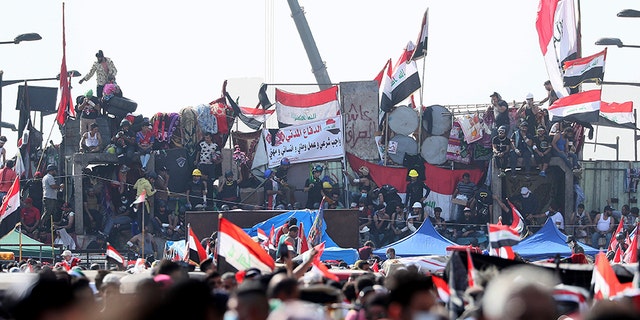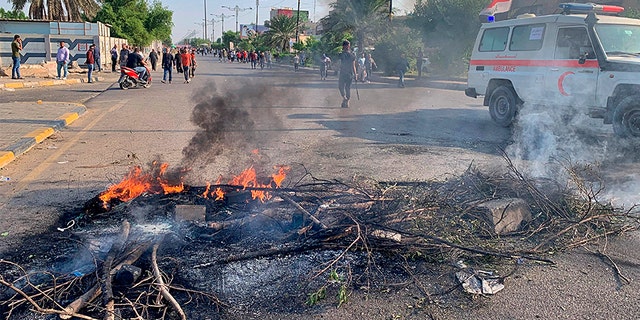Baghdad's Massive Riots
"[The unrest is costing the economy] billions of dollars."
"[The protests that] shook the political system [have achieved their purpose and must stop affecting the country's trade and economic activities]."
"Threatening the oil interests and blocking roads leading to Iraq's ports is causing big losses exceeding billions of dollars."
Abdul-Mahdi, Iraqi Prime Minister
"A witness told us [Monday] that the police responded with live ammunition, not tear gas, and that at least five people may have been killed."
"A medical source told us about 30 people have been injured and these injuries are gunshot wounds to the head and face. The injured include security forces as well as protesters."
Natasha Ghoneim, reporting from Baghdad
 |
| Anti-government protesters stand on barriers set by Iraqi security forces to close a bridge leading to the Green Zone government areas during ongoing protests in Baghdad, Iraq, on Monday. (AP) |
On Sunday, the appeal from Iraqi government authority was for protesters to cease and desist; the economy was faltering. Thousands of demonstrators burned tires and blocked major roads in the capital, Baghdad. Anti-government protests have been steadily mobilizing and their actions increased. Roads were obstructed with wooden pallets, barbed wire and the torching of furniture dragged into the thoroughfares. Central Tahrir Square has hosted huge numbers of people calling for the resignation of the government.
![Iraq forces fire live rounds at protesters in Baghdad Undeterred by the latest violence, protesters pushed on Monday with civil disobedience tactics they have increasingly adopted over the past week [Ahmad al-Rubaye/AFP]](https://www.aljazeera.com/mritems/imagecache/mbdxxlarge/mritems/Images/2019/11/5/80d0bbd4ace640ea9785aa8b2752e639_18.jpg) |
| Protesters pushed on Monday with civil disobedience [Ahmad al-Rubaye/AFP] |
Banners reading "Roads closed by order of the people" were held aloft, and calls for ending the political system that came out of the 2003 U.S.-led invasion of Iraq were rife. In the past month since the demonstrations began, over 250 people have died.
Security forces firing live rounds at protesters along with rubber bullets and tear gas canisters have increased the death toll. An inquiry launched by the government itself claimed security forces have used excessive force against protesters.
Despite that revelation and its release a hundred more people have been killed. At Iraq's main Gulf port, Umm Qasr close to Basra, there is a complete standstill where the bulk of the country's imports of grain, vegetable oils and sugar is normally received. An activist physician who had offered medical care to protesters was abducted on Saturday by unknown assailants. Physician Siba al-Mahdawi's whereabouts is unknown, yet the sinister abduction has not deterred protesters.
 |
| At least 250 people have been killed in the anti-government protesters since they began at the start of October. |
On Sunday, Iraqi security forces shot three protesters outside the Iranian Consulate in the holy city of Karbala. That led to Monday's demonstration where dozens of Iraqis fired up tires and attacked the consulate, scaling the concrete barriers surrounding the consulate, lobbing firebombs over the walls, chanting "the people want the fall of the regime", echoing the slogans of the 2011 Arab Spring. The goal was to haul down the Iranian flag over the consulate to replace it with an Iraqi flag. Ultimately the Iraqi flag was placed on the wall in front of the consulate, its message clear.
The lavish lifestyles of the country's political elite at a time when young Iraqis know their future holds a one-in-five potential of living below the poverty line, simply infuriates them even more, given that one in four among them is unemployed. "The protesters want radical change, but the ruling class would lose everything if such change came to pass", commented Abdulla Hawez, a regional researcher.
 |
| Protesters set fire to close a street in Sadr City during the ongoing anti-government protests in Baghdad, Iraq, on Monday. (AP) |
Labels: Crisis Management, Iran, Iraq, Political Realities, Protests
0 Comments:
Post a Comment
<< Home